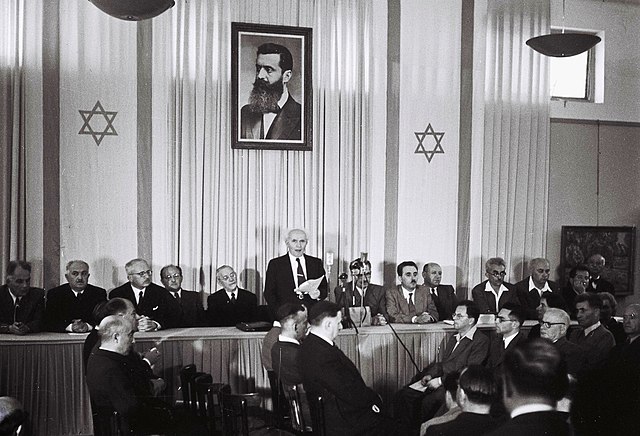Following the HCJ hearing on the amendment to Basic Law: The Judiciary regarding the reasonableness doctrine (HCJ 5658/23).
One-line Answer:
The Declaration of Independence is of enormous historical importance, expressing the people’s vision and their core beliefs, and a foundational document in the annals of the Jewish People’s state and story. Nonetheless, the HCJ clarified already back in 1948 that it is not law, and not constitutionally capable of constraining parliament. Until extremely recently, all three branches of government agreed on this uncontroversial issue.
Ben-Gurion’s image in the Dizengoff House and his voice reading out the Declaration of Independence on the 14th of May, 1948 (the 5th of Iyar 5708), still inspire emotions in Jews the world over. The smiles, the tears, and the thunder of applause from his real time audience reacting to his announcement establishing the Jewish state have been seared into national memory. Nevertheless, historical and national importance do not grant binding legal status, certainly not the kind of supreme legal status with the authority to strike down basic laws on the basis of an unchangeable document.
The Supreme Court sitting as the High Court of Justice first made the obvious distinction between importance in principle and actual legal status as early as the first few months after the state’s establishment. Since the War of Independence was raging, the young country was forced to postpone several important matters, such as the systematic arrangement of its laws, until its existence and its citizens’ existence were secure. Even so, the judiciary, based on the system left behind by the British, was operative from the very first day. Various questions were therefore put before the courts, including the Supreme Court sitting as the High Court of Justice. One of these questions involved the status of the Declaration of Independence.
The HCJ gave a definitive answer back in 1948: “The declaration served only to confirm the fact of the state’s establishment for the purposes of international legal recognition. It expresses the people’s vision and their core beliefs but is in no way constitutional law that can be used in practice to uphold or strike down laws and regulations”.
In another ruling several weeks later, this answer was underscored: “The Court rejects the claim that this document [the Declaration of Independence] constitutes a constitution according to which laws can be reviewed, prior to the establishment of a foundational constitution drafted by a constituent assembly, as the Declaration itself mentions”.
The foundational view of the Supreme Court at the time of the State’s establishment then, was that the Declaration of Independence had no binding legal status, certainly not the kind with the power to strike down laws. This view is self-evident under the historical circumstances. The body signatory to the declaration was the Provisional State Council – who saw themselves as filling a temporary role and who determined that immediately subsequent to the first elections, a constituent assembly should be convened to draft a constitution on the basis of which the state’s institutions would be founded. It was clear to those who drafted and ratified the Declaration of Independence that they were not a representative body invested with the authority to draft a constitution or to restrict the people’s sovereignty – through their elected representatives – to draft their constitution and legislate. The provisional body which had gathered to declare the establishment of the state had no intention of restricting the people’s future sovereignty.
It is worth noting that another issue raised in the same HCJ ruling reveals a fundamental truth. The (rejected) claim was that until a constitution legislated by the constituent power was drafted, the validity of laws must be reviewed under some other higher norm. The implication is that once a constitution has been drafted, the laws are reviewed in light of its provisions while the constitution itself is not subject to review by any other norm.
As is well known, the Supreme Court has ruled since the 1990’s that because the basic laws constitute a quasi-constitution, the validity of laws is reviewed under their provisions, while the basic laws themselves are the higher norm. Until extremely recently, this was accepted as a basic precept.
Accordingly, the petitioners’ challenge to the amendment to the Basic Law: The Judiciary and some of the Justices’ remarks in the hearing lie outside customary legal consensus, and it is their position that in fact seeks to revolutionize the legal status of the Declaration of Independence.
By: Adv. Ariella Segal
Further Reading:
- HCJ 10/48 Zeev v. Acting District Commissioner of the Urban Area of Tel Aviv 84 A 85 (2.12.1948)
- HCJ 7/48 Al-Karbutli v. Minister of Defense 84 B 5 (3.1.1949)
- CA 450/70, Rogozinsky v. The State of Israel (10.12.1971)
- Nataf, Shimon. “The Eternal Provisonal Council? A Response to Aharon Barak”, Hukim 16 7 (2021)
שמעון נטף “מועצת המדינה הנצחית? תשובה למאמרו של אהרן ברק “מגילת העצמאות והכנסת כרשות מכוננת”” חוקים טז 7
Published originally in the KPF news-sheet, “One Line Answers” (B’Mishpat Echad)



